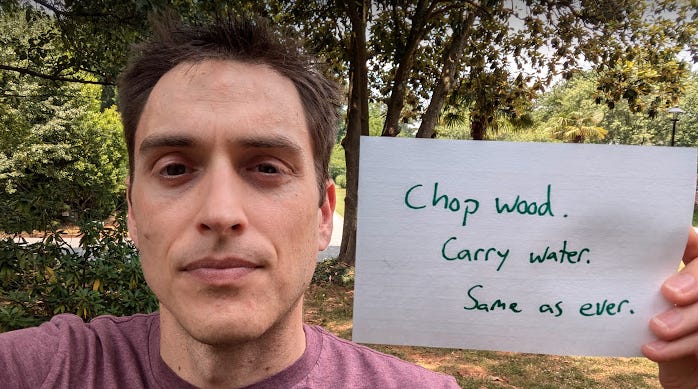🟢 What happens after enlightenment
The infinite game
(2 min read)
Welcome, new subscribers! Exciting to pass the 300 subscriber mark. Thanks for being here. 😀
Have you ever heard “chop wood, carry water”?
It comes from an ancient quote that somehow I’d never heard till this year:
“Before enlightenment: chop wood, carry water. After enlightenment: chop wood, carry water.”
Sometimes attributed to Wú Lì.
I’ve been thinking about this concept a lot recently.
Here is one interpretation I found1:
If a student asks how to reach enlightenment, the answer is “do your chores”.
💦 You need water to drink, cook, and clean. And long ago, you’d need to carry buckets of the water from a stream or well.
🔥 You’d also need firewood for cooking and for warmth.
Chopping wood and carrying water were therefore two of the most important tasks for survival.
But they’re also the most menial of daily tasks.
That explains the “Before enlightenment” part.
Once you attain enlightenment, what will your life look like?
You’ll still need to do those chores.
Your grandiose vision of what life could entail after enlightenment is a fixation, attachment, or preoccupation that you might as well release.
Taking care of one’s body and contributing towards the survival of your loved ones will be eternal obligations.
This relates to what I mentioned in my previous post.
How can we be mindful and present?
How can we maybe even enjoy the struggle?
Personally, I feel like I’m getting better about this at the daily or weekly level.
I can often zoom out and have a sense of perspective, patience, and humor.
But not at the minute-by-minute level.
For example, this past weekend, I spent time working on chores that feel have felt2 like the most boring, annoying chores imaginable.
Beginning to assemble a “death playbook”.
I’ve procrastinated for so long but finally got started.
The idea is to make my loved ones’ lives easier if I become incapacitated unexpectedly.
I want them to have easy access to my accounts and information and know about my ongoing responsibilities.
Organizing financial documents for a class action lawsuit that affects us because of one of our investments.
If I can figure out how to be mindful while completing chores like those (and accept them rather than resist them), I’ll let you know.
In the meantime, I’ll continue a daily habit of sitting and practicing to control whether my “thinking” is active or dormant.
And I’ll keep in mind points like:
Don’t be addicted to thoughts of the future (or the past). Let them pass like clouds.
Don’t identify with thoughts as your thoughts. Just notice them.
To paraphrase Sam Harris, you could simplify your goal in life to simply: “Pay attention.”
That’s what truly living is.
Not numbing out. Not letting it pass you by.
Being conscious. Alert. Perceptive. Alive.
P.S. Even as your inner experience changes, what others observe from the outside won’t. Hence the “chop wood, carry water” quote at the beginning.
🕙 What we learned in recent posts:
🟢 Christmas morning vs evening (my least popular post ever)
🟢 The Misunderstood but Powerful Tool: Comparative Advantage (with free calculator)
Thanks for clicking the ❤️ button on this post so more people can discover it on Substack 🙏
I like to put negative feelings in past tense rather than assume that I’ll carry them into the future.




Needed this reminder today.
https://open.substack.com/pub/bariweiss/p/farm-camp-upstate-new-york-children-learn?r=15iqid&utm_medium=ios